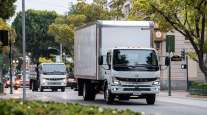Contributing Writer
Electric Truck Options Expand
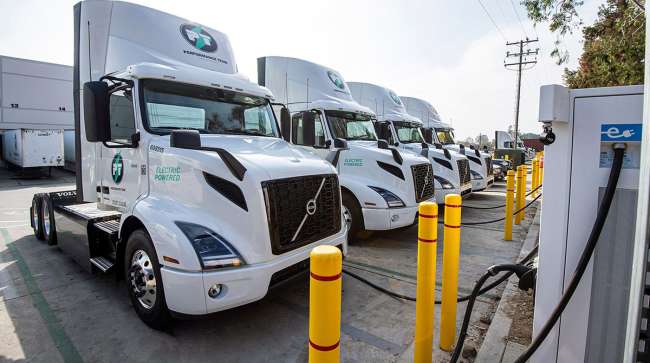
[Stay on top of transportation news: Get TTNews in your inbox.]
Battery-electric trucks are still a young, emerging segment of the commercial vehicle market, but fleet operators already can choose from a broad selection of electric vehicle options from a long list of manufacturers.
In general, the limited range and added cost of today’s battery-electric trucks, combined with the lack of widespread charging infrastructure, have restricted these vehicles to shorthaul applications such as local distribution, pickup and delivery, and drayage, along with certain vocational operations and some regional routes.
Still, electric truck sales are poised to expand in the coming years, particularly in the medium-duty range, due to upcoming emissions regulations and financial incentives, along with technology advancements, industry analysts said.
Ann Rundle, vice president of electrification and autonomy at ACT Research, expects 38% adoption of zero-tailpipe-emission vehicles in the Class 4-5 segment and 30% in Classes 6-7 by 2030. While Class 8 penetration will increase, she doesn’t expect widespread longhaul adoption until 2035 or 2040.

Rundle
Rundle predicted that battery-electric vehicle sales will see a big bump in 2027, when tougher nitrogen oxide rules will add $25,000 to $30,000 to the price of a diesel truck. Meanwhile, electric truck costs will fall over time.
“The electric is marching down, while the diesel is marching up, and so that’s why 2027 is sort of a magic year,” she said.
Wilfried Aulbur, a U.S.-based senior partner with global consulting firm Roland Berger, said electric truck market penetration could move faster than he previously expected.
“We are at the beginning of significant innovation in the battery space, in the charging space, and that obviously leads to a situation where we may be surprised on the upside,” he said.
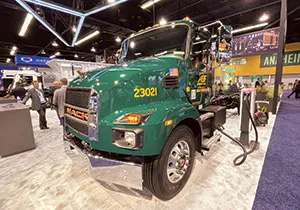
Mack’s new MD Electric model on display at an industry show. (Seth Clevenger/Transport Topics)
Aulbur earlier had thought the take rate for medium-duty zero-tailpipe-emission vehicles, composed largely of electric vehicles, could increase significantly in 2025 and reach 30% to 40% by 2030. He had thought the heavy-duty market would reach 5% to 15% in that same time frame.
Now he believes that transformation could happen faster with advancing technology and with incentives offered by the Inflation Reduction Act of 2022, which provides up to $40,000 per truck plus significant incentives for locally produced batteries.
According to the State of Sustainable Fleets 2023 Market Brief by transportation and energy consulting firm Gladstein, Neandross & Associates, clean fleet incentives will average $32 billion annually the next four or five years. Of that, $24 billion would come from the IRA and the Infrastructure Investment and Jobs Act of 2021. Those incentives will partially cover the big price difference between diesels and electrics.
The base price of a Class 8 battery-electric truck is between $350,000 to $500,000, or three to five times that of a diesel. Meanwhile, 13 states and the District of Columbia, representing more than 40% of the U.S. population, have passed or are considering rules similar to California’s phased-in sales mandate for zero-tailpipe-emission trucks.
Aulbur said the United States is ahead of Europe but trails China in electric vehicle development. The IRA gives manufacturers a 10-year window of security for investments. It also helps the United States control raw materials and remain strategically independent.
“I really do believe that the public money that’s on the table is basically telling industry, ‘Listen, you have to make the move,’ ” he said. “And industry knows that they have to make the move.”
Still, the number of medium- and heavy-duty electric vehicles on the road today remains small and manufacturers are still scaling up production.
The pricing and operational challenges of switching to electric trucks are massive, Aulbur said. In addition to the costs of the trucks, fleets will need huge amounts of electricity and potentially a new substation, more depot space for charging stations, and either more people or autonomous solutions for nighttime charging. Data capabilities will need to be enhanced to plan routes.
Nonetheless, Aulbur is still bullish on electric trucks.
“The thing that we need to keep in mind is we have about, what, 130 years of invention and innovation in the diesel engine behind us, and we have been starting to take electrification seriously in say, 2015,” he said.
Rundle of ACT Research said electric trucks are not at price parity with diesels but can have a positive total cost of ownership comparison.
Adoption is occurring in certain segments, such as yard spotters, which operate at slow speeds in depots with a lot of stop-and-start battery regeneration and an environment ripe for “opportunity charging” where the truck is stopped long enough for a partial recharge.
Electric trucks make sense in other market segments such as refuse and parcel delivery. The latter actually are not ideal applications for diesel and gas engines because of the many stops and starts.
“It’s not a case of, well, it’s not going to happen until X years down the road. It’s happening now,” she said.

Roeth
Mike Roeth, executive director at the North American Council for Freight Efficiency, said battery-electric propulsion currently makes the most sense for smaller, urban vehicles, such as delivery vans and medium-duty box trucks. The vehicles are more expensive, but the battery packs aren’t so large that weight and cost become problems.
In 10-15 years, shorthaul inner city trucks will be largely electric, he said, but the longhaul sector has special challenges so it will be a while before it’s ready. Challenges exist with the charging infrastructure and financing.
“One of the things we’re really learning is 50 trucks is a small town from an electricity demand standpoint, so it’s just not plugging them into the wall,” Roeth said. “It’s the utility doing work outside of your property to be able to get you that much power.”
But Roeth said the industry will advance one step at a time. The technology is available and established. Electricity increasingly is coming from greener sources such as wind and solar.
“This is not rocket science,” he said. “We know how to get big power at a location.”
All of North America’s top producers of heavy- and medium-duty diesel powered commercial trucks have launched battery-electric models, as have several newer players in the market such as Nikola and Tesla.
Volvo Trucks North America, for one, has been rolling out its VNR Electric Class 8 tractors.
Bobby Compton, VTNA’s regional haul product marketing manager, said customers are using these trucks, which offer a range of up to 275 miles, on planned daily routes that return the truck to base at day’s end. Drayage operations are within range and allow opportunity charges on lunch breaks.
The global truck maker aims to reach 100% carbon neutral sales by 2040 with sales divided between battery-electric trucks, hydrogen fuel cell trucks and vehicles with internal combustion engines powered by renewable fuels.
“We wouldn’t want to put a specific number on which technology will have what percentage at this stage. We do anticipate a majority being battery-electric or fuel cell,” Compton said.
Electric Truck Models
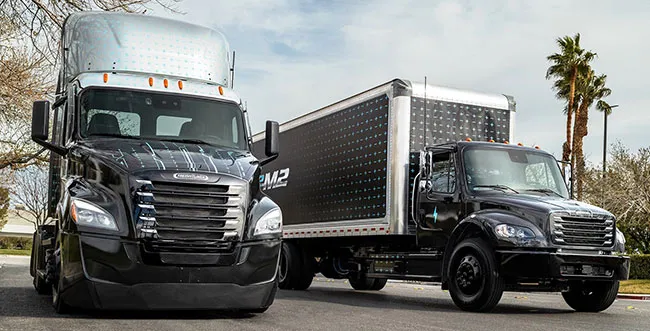
DTNA offers the Freightliner eCascadia (left) and eM2 battery-electric models. (Daimler Truck North America)
Daimler Truck
Daimler Truck North America’s battery-electric Class 8 Freightliner eCascadia is available for reservations in two battery capacity offerings. Its 438 kilowatt-hour battery can provide a typical range of 230 miles in a 4x2 configuration or 220 miles in a 6x4 configuration. Its 291 kWh battery provides a range of 155 miles on the 4x2 configuration. The vehicle can charge up to 80% in as little as 90 minutes.
DTNA premiered the production version of its battery-electric eM2 medium-duty box truck for pickup and deliveries at the Advanced Clean Transportation Expo on May 2 and said it is ready to order, with production to start this fall. A Class 6 single motor version with a 194 kWh battery will provide a typical range of 180 miles per charge, while a Class 7 dual-motor version with a 291 kWh battery will provide a typical range of 250 miles.
DTNA also recently announced the launch of its Rizon line of medium-duty electric trucks covering a versatile mix of configuration and options, starting with its Class 5 e18L and Class 4 e16L and e16M cabover models for urban delivery.
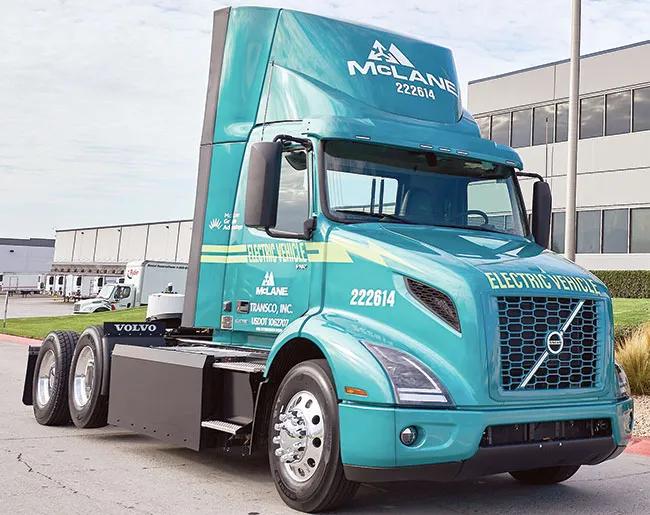
Volvo’s VNR Electric Class 8 tractor is available with a range of up to 275 miles. (Volvo Trucks North America)
Volvo Trucks
Volvo Trucks North America offers its VNR Electric Class 8 truck in a variety of configurations. A version with six battery packs has a range of up to 275 miles and can reach an 80% charge in 90 minutes. The four-battery system is available as a tractor with a 4x2, 6x2 or 6x4 setup, or as a straight truck with a 4x2 or 6x2 axle option. The truck maker said it had delivered 251 VNR Electric trucks as of May 2.
The company also has tripled its number of certified electric vehicle dealerships in North America during the past year to 36 locations in May 2023, up from 12 locations in May 2022, with another 56 locations currently undergoing the certification process.
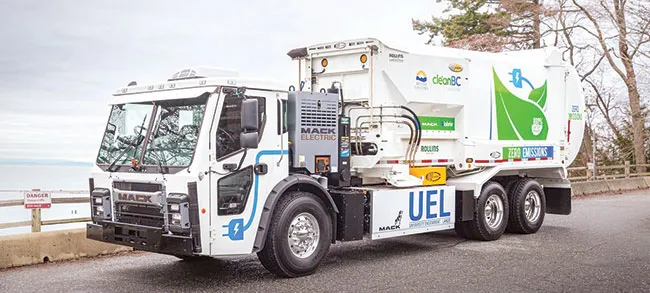
Mack has introduced its LR Electric model for refuse fleets. (Mack Trucks)
Mack Trucks
Mack Trucks, which is part of the Volvo Group, offers its battery-electric LR Electric refuse truck and also recently introduced its Class 6-7 MD Electric with a maximum range of 230 miles depending on the battery configuration.
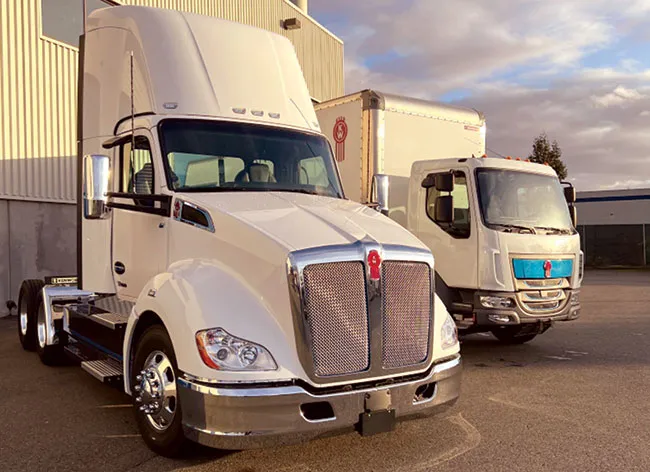
Kenworth’s electric truck lineup includes its T680E (left) and K270E models. (Kenworth Truck Co.)
Kenworth Truck Co.
Kenworth Truck Co., a business unit of Paccar Inc., offers a range of medium- and heavy-duty battery-electric trucks.
Kenworth’s electric Class 8 truck, the T680E, is available as a day cab tractor or straight truck with an estimated operating range of up to 150 miles depending on the application. Kenworth’s Class 7 K370E and Class 6 K270E cabover models designed for local distribution come in multiple configurations and can travel up to 200 miles with a 282kW battery pack and recharge in two hours with a DC fast charge.
Kenworth also has partnered with Toyota Motor Corp. to produce Class 8 hydrogen fuel cell electric trucks with a range of up to 450 miles for the North American market, with production set to begin in 2025.
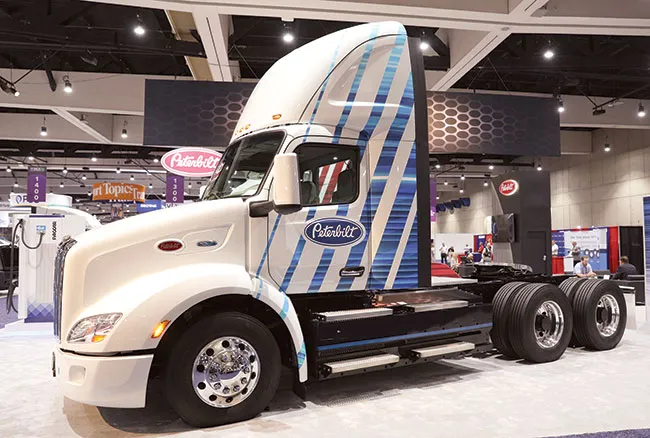
Peterbilt’s Model 579EV electric tractor on display at ATA’s 2022 Management Conference & Exhibition. (John Sommers II for Transport Topics)
Peterbilt Motors Co.
Paccar Inc. business unit Peterbilt Motors Co. also offers a lineup of three battery-electric truck models. The Peterbilt Model 579EV Class 8 truck has a 150-mile range and can be charged in three hours. Its Model 220EV comes as a Class 6 or Class 7 version with a 141 kWh battery configuration with a 100-mile range or 282 kWh battery configuration with a 200-mile range. The company also offers its 520EV refuse truck.
Peterbilt said it has delivered electric trucks to more than 100 customers. Fleets are using the 579EV for drayage, regional hauls and utility tractors, while the 220EV is being used for urban and food delivery. Other anticipated early adopters are fleets running airport food deliveries, dump trucks, refuse transfer trucks and crane trucks.
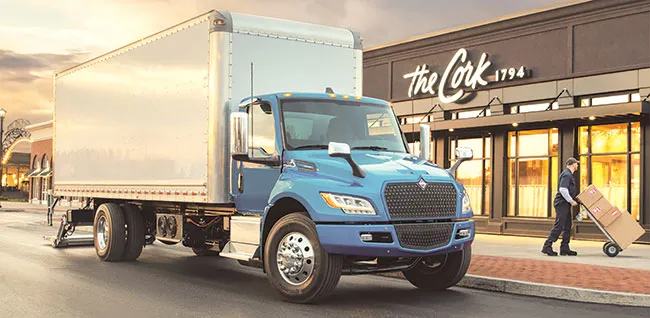
Navistar has adapted its International eMV Series to new applications. (Navistar)
Navistar
Navistar, part of global truck maker Traton Group, offers its battery-electric International eMV Series medium-duty truck for multiple applications, including pickup and delivery and vocational vehicles such as electric bucket trucks, mini mixers, stake dumps and utility vehicles. The eMV’s 210 kWh battery offers a capacity of 135 miles. With a 120 kW DC charger, the truck can be recharged in two hours.
CEO Mathias Carlbaum said May 3 at ACT Expo that Navistar also plans to introduce a Class 8 battery-electric truck for regional haul applications in the near future.
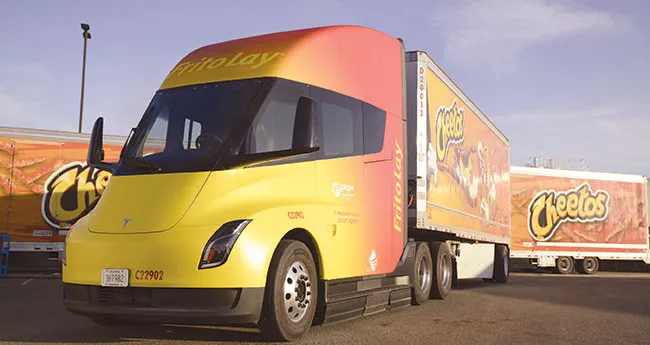
Tesla delivered its first battery-electric Tesla Semis to PepsiCo earlier this year. (Frito Lay North America)
Tesla
Electric carmaker Tesla has entered the commercial vehicle space with its battery-electric Tesla Semi, which offers a range of up to 500 miles. CEO Elon Musk celebrated the deliveries of its first production trucks to private carrier PepsiCo at a Dec. 1 event where the manufacturer played video of a Tesla Semi hauling a full load from Fremont, Calif., to San Diego on a single charge.
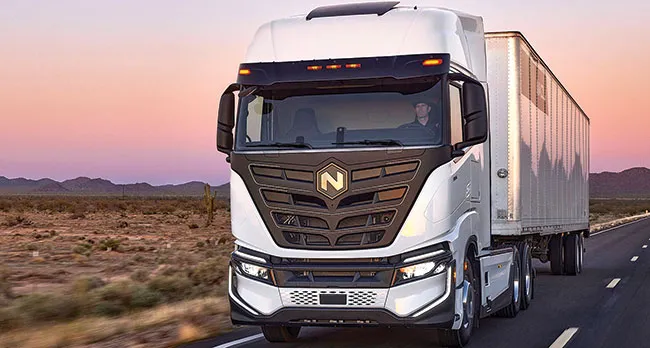
Nikola offers its battery-electric Nikola Tre model and plans to begin delivering a fuel cell electric version later this year. (Nikola Corp.)
Nikola Corp.
Zero-emission truck startup Nikola Corp. builds battery-electric and hydrogen fuel cell electric Class 8 trucks. The company’s battery-electric Nikola Tre model, which went into production in 2022, has a maximum range of 330 miles and can be charged to 80% in 90 minutes. In its fourth quarter earnings report, Nikola said it had produced 258 vehicles and delivered 131. Customers are using it for shorthaul metro-regional applications.
Nikola also is planning to launch the hydrogen fuel cell version of the Nikola Tre with a range of up to 500 miles and an estimated refueling time of less than 20 minutes in the second half of 2023.
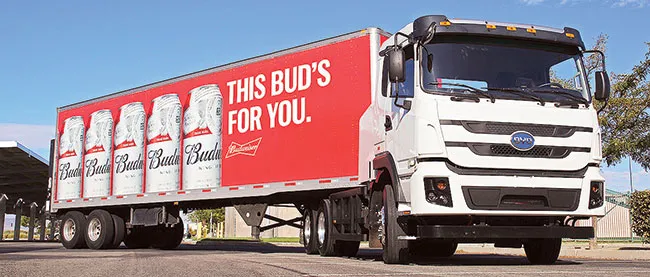
Anheuser-Busch has deployed BYD’s electric Class 8 tractors in its private fleet. (Anheuser-Busch)
BYD
China-based BYD produces the 8TT, an all-electric Class 8 day cab tractor with a battery capacity of 422 kWh and charging time of 2.5 hours. It also offers the 8R refuse truck, the 8Y terminal tractor, the 6F Class 6 cab and chassis and the 6R refuse truck.
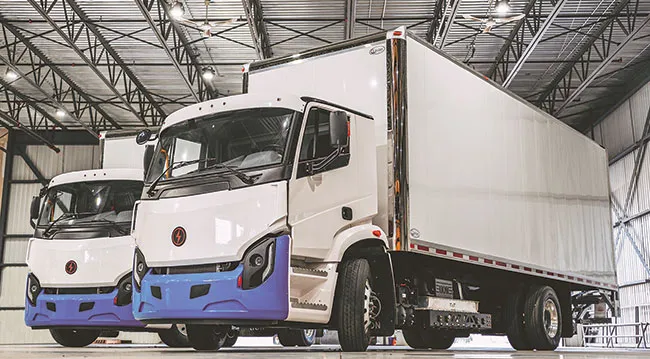
Lion Electric offers multiple battery-electric truck models. (Lion Electric)
Lion Electric
Canada-based Lion Electric’s battery-electric truck lineup includes the Lion8, the Lion6 and, as announced May 3 at ACT Expo, the Lion5. The heavy-duty Lion8 has a range of 142 miles and a charging time of 1.5 hours. The Lion6 Class 6 has a range of 218 miles with two hours of charging time. The Lion5 is a Class 5-6 vehicle that offers a driving range of up to 200 miles and can recharge to 80% in 1.5 hours.
Other Manufacturers
A growing number of other manufacturers also have announced plans to launch battery-electric or fuel cell electric commercial vehicles.
Hino Trucks earlier this year announced plans to offer electric versions of its M- and L-Series medium-duty trucks starting in 2024.
Electric vehicle startup company Xos Inc. has launched an updated battery-electric step van and is taking pre-orders for its electric MDXT medium-duty truck and its electric HDXT heavy-duty tractor for regional hauls. Fleets are currently operating Xos’ electric vehicles in the parcel delivery, uniform rental and cash-in-transit industries.
Hyundai Motor Co. is bringing its Xcient hydrogen fuel cell electric Class 8 truck to the North American market. The zero-emission cabover tractor has a vehicle range of more than 450 miles per charge when fully loaded at 82,000 pounds and can refuel in about 30 minutes, Hyundai said.
Hyliion Holdings Corp. is introducing electrified powertrains for Class 8 trucks that incorporate generators powered by renewable natural gas, hydrogen or other fuels to charge the batteries.
Hyzon Motors produces a hydrogen fuel cell electric powertrain that it installs on Freightliner Cascadia chassis.
Want more news? Listen to today's daily briefing below or go here for more info:




